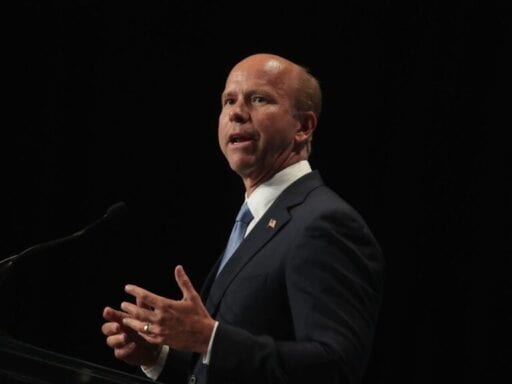Delaney tried to position himself as a moderate who could tackle health care, but it wasn’t enough to help him stand out in a crowded field.
Former Maryland Rep. John Delaney, a man who tried to position himself as the most sensible person to tackle health care, has officially ended his run for the presidency.
Delaney, who was the first notable Democratic candidate to enter the race, announced his dropout Friday — over two years after he first launched his campaign. It’s a bitter end for a candidate that made the ambitious decision to step away from Congress in 2018 to move full-time to Iowa, the first caucus state. Despite that move, he struggled to poll above 1 percent nationally or in the state, and hadn’t made it onto a debate stage since July.
The candidate tried to distinguish himself on one key subject: health care. As a former health care financier, Delaney was arguably one of the most knowledgable candidates on the subject.
“This race was never about me, but about ideas and doing what’s right for our nation,” Delaney said in a statement also shared on Twitter. “The unique and data-driven ideas that our campaign generated — on how to create a functional universal health care system, price carbon, advance trade, invest in rural America, cure disease, help workers, launch negative emissions technologies, reform education, and expand national service — are now ideas for the party and I will continue to advocate for them in my next chapter.”
As Vox’s Dylan Scott summarized it, the outline for Delaney’s plan was simple:
- Every American under 65 would be enrolled in a new public plan that covers a certain set of basic medical services, comparable to the essential health services covered by Obamacare.
- Employers and individuals could purchase supplemental insurance.
- Medicare for people over 65 would be untouched.
- The plan would be paid for mostly by maintaining the shared state-federal payments for Medicaid and by ending the unlimited tax break for employer health benefits.
Delaney openly supported the existence of private insurance within his proposal, partially to quell the fears of those more skeptical seniors who are worried they’ll have worse coverage under a universal plan. Although Delaney’s plan would eventually lead to universal coverage, he made it clear in an interview with Scott that it wouldn’t be the same as Medicare-for-all:
If you think about Medicare, which is an incredibly successful program, its success is in part based on the fact that there is private insurance mixed in with Medicare in terms of these supplemental plans. When I do events with seniors and I say how many of you have Medicare, pretty much all the hands go up. When I say how many have a supplemental plan, most of the hands go up. Why do we want to go around most of those supplement plans that are legal?
I think in an effort to try to say I’m gonna move the goalposts further than anyone else, we have created a proposal that actually is really bad economics and also is not what people want.
Despite having positioned himself as a candidate that could combat the more progressive and polarized end of the party, Delaney found himself in the shadow of other moderates, including former Vice President Joe Biden; South Bend, Indiana, Mayor Pete Buttigieg; and Sen. Amy Klobuchar.
And as Scott noted, it was always questionable whether it would be “a winning strategy to tell an excited young progressive base that their trademark policy idea is a loser.”
Sensible or not, Delaney’s health care plan wasn’t enough to make him stand out in a crowded field.
Author: Catherine Kim
Read More



